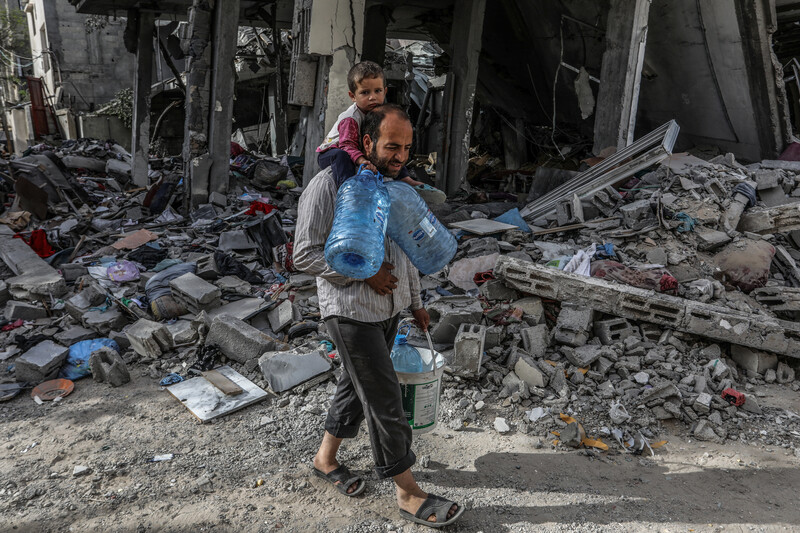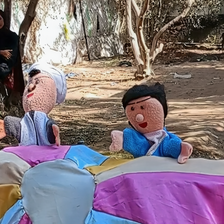The Electronic Intifada 1 May 2024

Rafah is under attack from the air and Israel is threatening a ground invasion.
DPA via ZUMA PressSince Israel declared its current war on Gaza, my family have been forced to move numerous times.
On each occasion, our displacement was caused by a need to escape Israeli bombardment or to search for better living conditions.
The first time we had to move was on 11 October.
My family and others in al-Nasr, a Gaza City neighborhood, received phone calls from the Israeli military ordering us to evacuate. Although our area was residential, we were told it was now considered a combat zone.
The decision – if that is the right word – to leave was the most difficult one I have ever made.
I had no idea how long we would be away from our home.
My husband helped me select the most important possessions to put in a bag.
I put some clothes for my five children and a small box containing important documents. They included ID cards from the UN agency for Palestine refugees (UNRWA).
The cards proved that our family are originally from Bir al-Saba, a town in historic Palestine which Israeli forces captured during the last few months of 1948.
I added an album with some family photographs. Among them were pictures of my wedding 12 years earlier.
Saida, my eldest daughter, asked that we put her school certificates in the bag.
Then we fled our home for my father’s house in Abu Iskander, northern Gaza. My dad welcomed us.
We had to sleep on the floor without pillows or blankets.
My husband tried to comfort me. “We will return home and sleep in our own beds again,” he said.
For three consecutive days, we heard the sounds of explosions everywhere. The bombing became increasingly intense.
Then I realized that we would not be returning home anytime soon.
A birth amid the bombs
On 13 October, we had to flee once again. That was when Israel instructed everyone in the northern part of Gaza to move southwards.
We were in a very difficult situation. My sister-in-law Sarah was nine months pregnant.
Sarah’s husband – my brother – asked that I accompany her as she went to hospital in Gaza City.
That meant I had to leave my children with my husband and join them later. My own children started to cry when they heard I would have to be away from them for a while.
Sarah gave birth to a baby boy in al-Shifa, Gaza’s largest hospital – which Israel subsequently destroyed. She named her child Khaled.
I accompanied Sarah and her baby to a school run by the UN agency for Palestine refugees (UNRWA) in Nuseirat, central Gaza. Many members of my extended family had already taken shelter there.
Despite the circumstances, my brother was overjoyed to see his newborn son.
Living conditions in the school were very poor. There was no clean water and food was scarce.
And the school was overcrowded with people who had been displaced.
I told my father and my husband that we would have to find somewhere better for Sarah and her baby. “Or they will get sick,” I said.
Cramped
We did not spend long in the school as my father’s cousin Majed invited us to stay at his home in the southern city of Khan Younis.
Twelve of us moved in with Majed, including baby Khaled and his parents. It was very cramped.
We lived with Majed for approximately a month. Every day we had to search for food and water.
As the conditions were bad, we decided to leave Majed’s home. This time we went to the house of my husband’s uncle, who is known as Sheikh Muhammad.
He works as a paramedic and had a spacious home in Deir al-Balah, central Gaza. As Sheikh Muhammad had a well in the grounds of his home, we did not have to go looking for water.
We organized a small party to mark how Khaled was now a month old. My children enjoyed the celebration.
Sheikh Muhammad and his family were very friendly.
“What will you do when you return to your home after the war ends?” Sheikh Muhammad asked me once.
“I will pray and thank God because our lives will have returned to normal,” I replied.
Terrible news
Only two days later, we got terrible news from some of my husband’s friends, who had stayed in Gaza City, defying Israel’s evacuation orders. They informed us that our home had been completely destroyed.
I felt dreadful and started to wonder if we would be displaced forever. Where would we live after the war?
On 1 January, Sheikh Muhammad got a call from a neighbor.
Israel was about to bomb the house next door, Sheikh Muhammad was told. It was necessary to evacuate.
We fled Sheikh Muhammad’s house, which was badly damaged when Israel bombed the area soon afterwards. The house is no longer habitable.
We went to Rafah, Gaza’s southernmost city.
My father was able to travel into Egypt. He had to pay around $25,000 to the Egyptian authorities so that he and some members of our extended family could travel out of Gaza.
In Rafah, my husband bought a tent. We pitched it inside a park.
Living in the tent was worse than anything we had ever experienced. We were bitterly cold at night.
After about two months, we decided to move into an organized camp in the center of Rafah.
The camp administrators provided us with water and food aid.
We are still in Rafah. Benjamin Netanyahu, the Israeli prime minister, is threatening a major offensive against the city.
His threats fill us with fear.
We are facing the prospect of being uprooted once more and do not know where we will go.
Rasha Abou Jalal is a journalist in Gaza.





